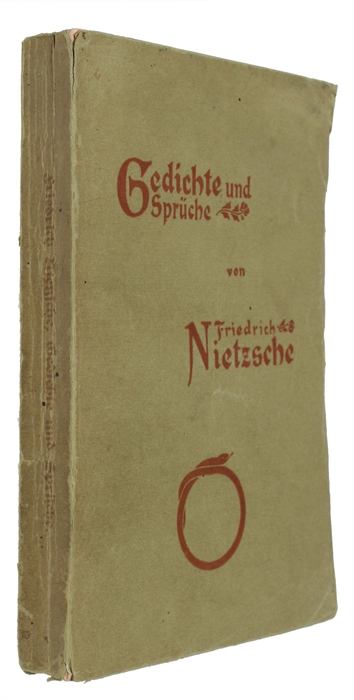FRIEDRICH JODL'S COPY
NIETZSCHE, FRIEDRICH.
Gedichte und Sprüche.
Leipzig, Naumann, 1898.
Small 8vo. Uncut in the original green printed wrappers. Spine with a bit of wear and minor wear to extremities. A very fine and clean copy in the scarce original wrappers. A 4-line presentation-inscription by Friedrich Jodl to front free end-paper, dated "23.8.98".
The rare first edition of Nietzsche's poems and maxims, the first complete collection of his poetry, which furthermore constitutes the first appearance of all nine, properly corrected, "Dionysian Dithyrambs" in one volume.
This one of 1.000 copies printed of the first run, without "Second Edition" on the title-page, as the other 1.000 copies of the first edition had.
According to Elizabeth Förster-Nietzsche, Nietzsche's sister who has assembled the present collection "[t]his collection of poems and maxims shows the entire poetic development of my brother over a period of 30 years. It begins at a time when the earliest stuttering poetical expression has been overcome and ends with the highest rising of the poetic spirit, who in order to find words can now only speak in dithyrambs." (own translation, from the Introduction, p. [XIII]). Numerous of the poems have never been printed before, and many are printed from the original manuscripts, which Elizabeth had in her possession.
Though Nietzsche is primarily understood and remembered as one of the greatest philosophers of all times, his poems occupy a central place in his literary production and many of them (e.g. the Dithyrambs) are intimately linked with the philosophy for which he is so famous today. Furthermore, the present volume underlines the popular modern view of Nietzsche as the not only philosophical, but also literary and artistic genious.
The first edition of the work is difficult to find and is rarely seen for sale.
THE PRESENT COPY HAS BELONGED TO FREIDRICH JODL (1849-1914), the famous German philosopher and contemporary of Nietzsche, and bears his signature as well as a 4-line dated presentation-inscription to front free end-paper.
Jodl ranks as one of the most significant representatives of German expressionism and is still remembered for his original ontological works with their constant focus on empiricism as the only true strand of philosophy. He has also written a number of important works within the history of philosophy and ethics, psychology and aesthetics, which for decades counted as standard works, and he is among the first to develop the intellectual environment that ultimately led to, among many other things, the founding of the Vienna Circle. His main task was to develop and spread a purely naturalistic ethics free of any religious or metaphysical elements, and he is considered a modern "Enlightenment philosopher", whose consistent empiricism, well-founded philosophical ideas, optimistic theories of culture, ethics, the value of life & the progress of man inspired many later thinkers and furthermore helped promote important political and social ideas, such as free popular education, etc.
His main works, which are now standard works within ethics and psychology, and which were printed over and over again, are "Geschichte der Ethik als philosophischer Wissenschaft", in which he presents man's cultural development as the process of liberation from religious and metaphysical ideas and the change from a theocentric to an anthropocentric foundation of ethics. This work is followed up by his purely epirically founded "Lehrbuch der Psychologie", which grounds the same ideas psychologically.
After having been Privatdzent in Munich, he was named professor of philosophy at the German University in Prague, and in 1896 he accepted a professorship of philosophy at the University of Vienna. He was greatly successful in Vienna and was considered the most prominent liberal professor here, whose numerous lectures and articles against the reigning "Ultramintanismus" and the clerical influence in schools and universities found great resonance with scholars and students. He had a huge number of followers, not only at the university, but also in the public, as a political figure as well. He is partly to thank for the emergence of an intellectual climate in Vienna in the 20th century, which later led to Neopositivism and the founding of the Vienna Circle.
"We need no other mediator between us and nature except our understanding and a courageous will, nor any mystery behind nature to console us for her; we are alone with nature, and we feel secure because we possess intellect and she behaves according to laws" (Jodl, Vom wahren und vom falschen Idealismus, p. 40).
Order-nr.: 43879

